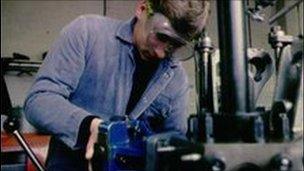Scotland 'avoiding double-dip recession'
- Published

The manufacturing sector grew at its fastest rate since November
Scotland's economy is avoiding a double-dip recession, the Bank of Scotland's chief economist has said.
Donald MacRae said that while growth was "not as positive as hoped for", there had been low growth and not negative growth for three months.
His comments came as November's figures showed the manufacturing sector grew at its fastest rate since August.
However, the rise was coupled with a subdued service sector, which recorded falls in orders and employment levels.
According to the Bank of Scotland's Purchasing Managers' Index (PMI) for November, there was a strong rise in new export orders for Scottish manufacturers.
The rise was put down to a boost in demand from China and the US.
Factory gate
Across the service sector, business services, travel, tourism and leisure all experienced declines in activity.
The financial services sector was the only one to record a modest rise.
The report also highlighted the rising price of raw materials and found that wages were pushing up costs for private firms.
Companies said they had been able to pass on some of the rises to clients, while manufacturers raised factory gate prices at a marked rate.
Discounting has also remained evident in the service sector.
Mr MacRae said: "This month's robust recovery in manufacturing partially offset the fall in service activity extending the slowdown in the Scottish economy into November.
"Scottish manufacturers saw a welcome strong increase in the volume of new export orders during the month providing evidence of an export led recovery.
"The sector also recorded a solid rise in production, the strongest since August."
He added: "While the latest PMI isn't as positive as hoped for, these results indicate the Scottish economy is avoiding a 'double dip' and experiencing low growth rather than negative growth."
The PMI report, compiled by Markit for Bank of Scotland, is based on data from purchasing executives in about 600 private manufacturing and service sector companies.
- Published19 October 2010
- Published13 September 2010
- Published3 September 2010
- Published9 August 2010
- Published21 July 2010
- Published14 June 2010